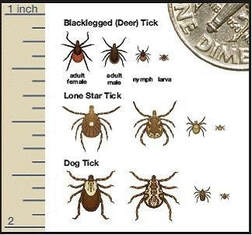|
Concord Animal Hospital's tips to keep your pet safe from ticks and tick-borne illnesses  Our clients are calling daily with questions and concerns about ticks - we are here to help! Here are answers to the four top ticks questions local pet owners are asking our medical team. What Kind of Ticks Are in Our Area? There are three main types of ticks in the Concord, Massachusetts area:
While people follow precautions for keeping themselves safe from ticks such as using bug spray and wearing long pants and socks, it’s important to do the same for our four-legged friends, too.  Hopefully Knuckles is just bringing home a little dirt, no yucky ticks! Hopefully Knuckles is just bringing home a little dirt, no yucky ticks! How Can I Keep My Dog Safe from Tick-Borne Diseases? Our veterinarians at Concord Animal Hospital strongly recommend using tick preventatives such as Bravecto or Simparica/Simparica Trio. While these chewable tablets are very effective at preventing tick-borne illnesses, they do not repel ticks. Instead they kill ticks several hours AFTER the tick bites your pet. For this reason, some clients double-up with a repellent collar in addition to a chewable tick preventative. Talk to one of our veterinarians to determine the best product for your pet given their health history, potential exposure to ticks and lifestyle. Should I use a tick preventative year-round? Yes, yes, and double yes! Frost and freezing temps DO NOT kill ticks. Ticks are dormant but come back to life in only 40 degrees - a high often achieved even in the coldest months. Our veterinarians see plenty of dogs with tick-borne illnesses throughout the winter. Our vets also suggest taking added precautions such keeping your dogs out of long grass or and away from undergrowth. These areas are where dogs like to sniff and explore, but they are also prime hangouts for ticks. After a walk, the American Kennel Association recommends checking some spots you might forget to look, such as inside ears and between toes, to make sure your pet didn’t bring any ticks home with them.
What Do I Do If I Find a Tick on My Dog?
If you find a tick on your dog, remove it as soon as possible! If it hasn’t attached itself yet, there is no risk of tick-borne illness for your pet. If it has attached, grasp the tick with a pair of tweezers as close to the site of attachment as you can and pull straight back. If you have found an attached tick, particularly one that is engorged, the MSPCA advises noting the date and time to discuss with your veterinarian. Watching for the following symptoms, but be aware that symptoms may not appear until several weeks or even months after exposure:
Comments are closed.
|
|
OFFICE HOURS:
Monday-Friday: 8:00 am to 6:00 pm Saturday: 8:00 am to 12:00 pm |
CONTACT INFORMATION:
Concord Animal Hospital 245 Baker Avenue Concord, MA 01742 Phone: (978) 369-3503 Fax: (978) 371-9748 [email protected] |
JOIN OUR PACK!
Sign up for our monthly newsletter, the Paw Press for hospital news, pet care tips and cute pet photos! |
Copyright © 2022
